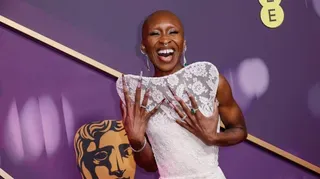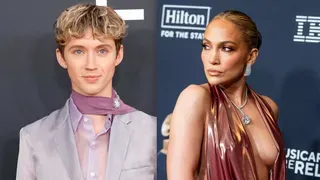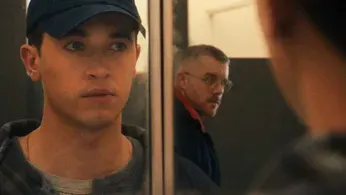
Feb 17
What were the Hottest Queer Films at Sundance 2025?
Frank J. Avella READ TIME: 12 MIN.
Sundance was a cinematic queerfest this year, boasting wonderful LGBTQ+ stories and characters. It wouldn't be surprising if a number of this year's titles went on to become major contenders in the 2025 awards season.
The only downside to covering the festival virtually is that many highly anticipated queer films were only available to press on the ground. It's disappointing that LGBTQ+ media weren't allowed access to "Kiss of the Spider Woman," "Jimpa," "The Wedding Banquet," and "Peter Hujar's Day."
Regardless, there were plenty of amazing queer-themed and queer-friendly features screened virtually. These are among the best of the narrative features.
'Twinless'
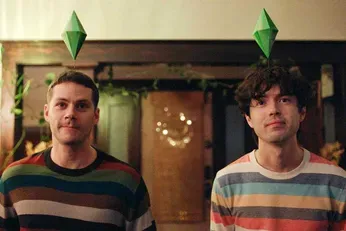
What starts out as a bro-mantic comedy takes a sharp, unexpected turn in writer-director-co-star James Sweeney's hilarious, poignant, and anxiety-inducing genre-blend, "Twinless."
Roman (Dylan O'Brien) first meets Dennis (Sweeney) in a bereavement support group for survivors who have lost their identical twin. The two become buddies, shopping for groceries, eating out together, etc... Roman, who is straight, isn't the brightest flair in the sky and misses his gay brother, Rocky, terribly. Dennis is gay and guilt ridden over how he lost his twin. The film then flashes back for a rather shocking reveal, and then careens forward for the repercussions. No spoilers. Suffice it to say, the film takes the viewer on a unique and emotional journey that never feels inauthentic, even when it approaches dark comedy.
O'Brien delivered a powerful turn in last year's "Ponyboi," and his performance in "Twinless" solidifies his place as one of the most impressive actors working in indie films today. It's a fantastic dual performance where he manages to play two very different, but super-connected, twins, one a well-educated egotist and the other a self-conscious, yet sweet, ruffian. As Roman, he strikes just the right tender/gruff balance. He justly won the U.S. Dramatic Special Jury Award for Acting. (Besides O'Brien's accolade, "Twinless" won the Audience Award: U.S. Dramatic.)
Sweeney's script perspicaciously explores loneliness, loss, trauma, and the need for connection. The film has a few graphic sex scenes – one gay – that never feel gratuitous.
"Twinless" is destined to be one of 2025's best films.
'Plainclothes'

Stress, anxiety, and tremendous fear are omnipresent emotions in Carmen Emmi's intense and rich psychological drama, "Plainclothes."
Set in the 1990s, when AIDS was still a death sentence, the film presents a time and place outside of the safer bubble worlds of New York or San Francisco, when most of gay America still had to hide in the closet, especially if their religious-based, ethnically-infused cultures expected – no demanded – that their young men marry and have children.
As late as the early 2000s, police here in the U.S. were still entrapping gay men via sting operations in cruise-heavy places like mall bathrooms.
The film focuses on one super-cute and promising police officer whose job is to go undercover to lure and arrest gay men who hook up in public places (before apps changed everything).
Closeted cop Lucas (Tom Blyth) ends up falling for one of his initial targets, Andrew (Russell Tovey), who is even more deeply closeted than Lucas. Both characters have good reasons for leading their double lives, but can't seem to quit each other, even though Andrew has a strict rule about not having sex with anyone more than once.
The non-linear narrative, as well as Emmi's use of lo-fi VHS footage to denote the paranoia, doubt, dread, and even excitement that Lucas feels, is supremely effective. It all builds to a denouement that is tremendously satisfying.
Blyth does truly astonishing, award-worthy work here. His Lucas is a mix of horny confusion at work and clinginess at play. At home, with his repressive family, he's a ticking time bomb.
Tovey has less to do, but in one of his later scenes he is so emotionally raw and searingly honest that it's impossible not to feel his pain.
Maria Dizzia is heartbreaking as Lucas's oft-conflicted mom.
Along with "Twinless," I can't imagine "Plainclothes" not ending up on many LGBTQ+ best lists.
"Plainclothes" won the U.S. Dramatic Special Jury Award for Ensemble Cast.
'Sorry, Baby'

Eva Victor is a true triple threat. Too often when one takes on the big three filmic hats, they show weakness in at least one of those cinematic challenges. Writer-director-lead actor Victor proves keen, comfy, and wildly talented in all three creative positions. The script is witty, charming, engaging, and disarming. Her direction shows a great ease with the camera and framing, as well as pacing. And as the lead, Agnes, a young grad student who has a traumatic experience with a respected professor, Victor delivers a heartfelt, devastating portrait of a woman trying to understand what has happened to her, never feeling too sorry for herself but showing bits of vulnerability and even bafflement.
Victor surrounds herself with a crackerjack ensemble, beginning with Naomi Ackie as Agnes's gay bestie, fab indie prince Lucas Hedges as her fuck buddy neighbor, a wicked Kelly McCormack as her jealous classmate, and a hilarious John Carroll Lynch as a wise, if gruff, sandwich shop owner who has all the best lines.
What makes "Sorry, Baby" such a wonder is how sincerely funny the film is, while also being a truly authentic take on rape and its aftermath. Agnes is healing, on her own terms and in her own time.
"Sorry, Baby" won the Waldo Salt Screenwriting Award: U.S. Dramatic.
'Lurker'
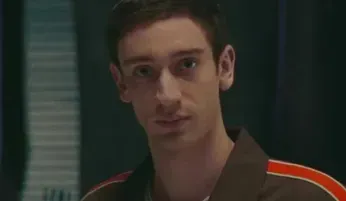
Théodore Pellerin, so immersive in Sophie Dupuis's queer-themed "Solo" in 2023, takes on the role of Matthew, a conniving and manipulative fan who works his way into the life of budding pop star Oliver (Archie Madekwe) and his entourage. At first we are sympathetic to Matthew's desire to be part of such a popular world, but slowly we begin to wonder just how far he's willing to go to stay in the coveted inner circle.
"Lurker" is slyly written and deftly directed by Alex Russell ("Beef," "The Bear") in his feature film debut. The film gets more layered and complex as it unfolds, hitting all the right beats, where it could have gone wrong so many different ways – especially in the last reel.
The film is a piercing critique of social media stardom and the rabid desire for fame, especially among Gen Zers. The obsessive, back-stabbing need to be a part of someone else's success is presented in a raw, unflinching manner, but the filmmaker sidesteps extreme judgment in favor of understanding and empathy.
Both Pellerin and Madekwe ("Saltburn") deliver layered performances, and their homoerotic chemistry is off the charts.
'Rains Over Babel'
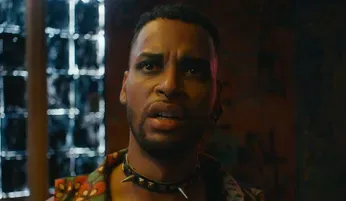
Spanish-Colombian filmmaker Gala del Sol's electrifying, queer-positive feature debut, "Rains Over Babel," takes place predominantly in a dive bar that doubles for a purgatory where drag queens flourish, a figure known as La Flaca plays literal games with people's lives, a handsome former soldier acts as a kind of Grim Reaper, and snakes are to be feared – but a certain lizard might just save the day!
Did that make any sense? No? Well, oddly del Sol's fantastical, mesmerizing film does, at least most of the time. And when it doesn't, it's still a blast to behold. She's created a fevered punk "island of misfit toys"-type world where acceptance can be cathartic, but death is always looming.
The cast includes sizzling newcomers like Felipe Aguilar Rodriguez as the yummy, but dead, soldier longing to say one last goodbye to his lover, and sexy Santiago Pineda as El Boticario, who may or may not be Satan.
"Rains Over Babel" is a one-of-a-kind, beguiling, magical realism fantasia. Del Sol is an exciting new filmmaker. I can't wait to see what she does next!
'Sauna'
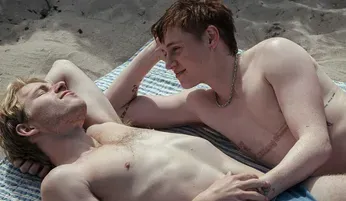
Set in Copenhagen, writer-director Mathias Broe's first feature, "Sauna," is a thought-provoking, messy, often fearless look at one deeply flawed young gay man and what happens when he finds himself falling in love with a transgender man.
Handsome Johan (a captivating Magnus Juhl Andersen) works as a receptionist at Adonis, a gay sauna, and has a sex-filled, relationship-free lifestyle – although he appears open to more.
One horny night, without bothering to fully read an app profile, he hooks up with William (Nina Rask), a trans man whose world is very different from Johan's. The two form a tender, if fragile, bond, since both exist in diverse and contrasting milieus.
Broe explores both men's realities, one buoyed by desire and the other stymied by political and social limitations. The filmmaker cleverly examines sexual identity and orientation, and where they converge and diverge. Neither character seems to know how to empathize with the other, and in that authentically presented conundrum the audience is able to challenge their own preconceived notions and sympathize with both.
'Two Women'
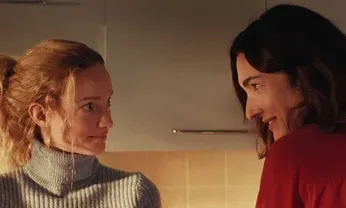
Quebec filmmaker Chloé Robichaud's fourth feature, "Two Women," is a contemporary retelling of Claude Fournier's 1970 comedy "Two Women in Gold," and it's a true gem. Adapted by Robichaud and Catherine Léger, the film centers on two suburban next-door neighbors, Florence (Karine Gonthier-Hyndman) and Violette (Laurence Leboeuf), both in strained relationships with men and both seeking alternate types of fulfillment, usually involving repairmen! The leads are absolutely wonderful. Félix Moati and Mani Soleymaniou portray the often-useless significant others with pathetic panache.
Robicaud's style is quite sly, as she seamlessly blends hilarious situations with nuanced characterization, keeping the emphasis on female desire and empowerment. The film has a gay sensibility about it, thanks to the two lead diva performances.
"Two Women" won the World Cinema Dramatic Special Jury Award for Writing (Chloé Robichaud and Catherine Léger).
'Sabar Bonda' ('Cactus Pears')
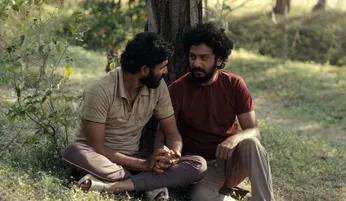
Rohan Parashuram Kanawade's feature debut, "Sabar Bonda" ("Cactus Pears") is a slow-burning, meditative, and exquisite look at same-sex love and longing in a culture that expects a certain kind of generational behavior and capitulation. Kanawade's semi-autobiographical narrative examines the lives of rural and lower castes of India – not the obvious setting for a queer love story.
The film centers on Anand (Bhushan Bhingarkar), a 30-year-old who lives in Mumbai but must return to his countryside home to bury his father and observe the 10-day mourning period. He must also endure a constant barrage of questions about his marital status. Anand has no intention of marrying (a woman, anyway), and rekindles a relationship with his close childhood chum, Balya (Suraaj Suman), who is also unmarried, despite pressure from his family.
The film is about bonds familial and romantic, daring to explore what happens when those conflicting twains collide.
"Sabar Bonda" won the World Cinema Grand Jury Prize: Dramatic, and is the very first Marathi language feature to premiere at Sundance.
'Where the Wind Comes From'

Tunisian writer-director Amel Guellaty makes her feature debut with "Where the Wind Comes From," an engaging story of pursuing dreams no matter how out of reach they might seem.
Alyssa (Eye Bellagha) is a 19-year-old girl who does not like living by patriarchal-dictated rules. Her shy best friend, Mehdi (Slim Baccar), isn't very happy with his current reality, either. When Alyssa devises a plan where the two of them can flee Tunisia for Germany via an art contest, the film slips into chaotic road-trip mode where the hope for a better future could be within their reach. Along the way, one of them has a queer experience that is delightfully matter-of-fact, but could also be life-changing. "Where the Wind Comes From" is a charming treat.
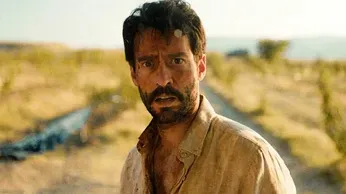
Also highly recommended are two non-queer films:
Hailey Gates' brilliant feature debut, "Atropia," is set in a lunatic military prep facility in 2006, where soldier wannabes battle faux Iraqis. It's the stuff of genius satire, with a fab ensemble led by the hilarious Alia Shawkat and sexy charmer Callum Turner. "Atropia" won the U.S. Grand Jury Prize: Dramatic, the top award at Sundance.
Alireza Khatami's Lynchian mindfuck "The Things You Kill" picked up the Directing (World Cinema Dramatic) Award. The film centers on an university English lit professor in Turkey discovering damning secrets surrounding the death of his mother. A thrilling, bewildering, and game-changing twist takes the viewer on an unexpected journey that confounds expectations. "The Things You Kill" is bold and transfixing cinema.
Frank J. Avella is a proud EDGE and Awards Daily contributor. He serves as the GALECA Industry Liaison and is a Member of the New York Film Critics Online. His award-winning short film, FIG JAM, has shown in Festivals worldwide (figjamfilm.com). Frank's screenplays have won numerous awards in 17 countries. Recently produced plays include LURED & VATICAL FALLS, both O'Neill semifinalists. He is currently working on a highly personal project, FROCI, about the queer Italian/Italian-American experience. He is a proud member of the Dramatists Guild. https://filmfreeway.com/FrankAvella https://muckrack.com/fjaklute


